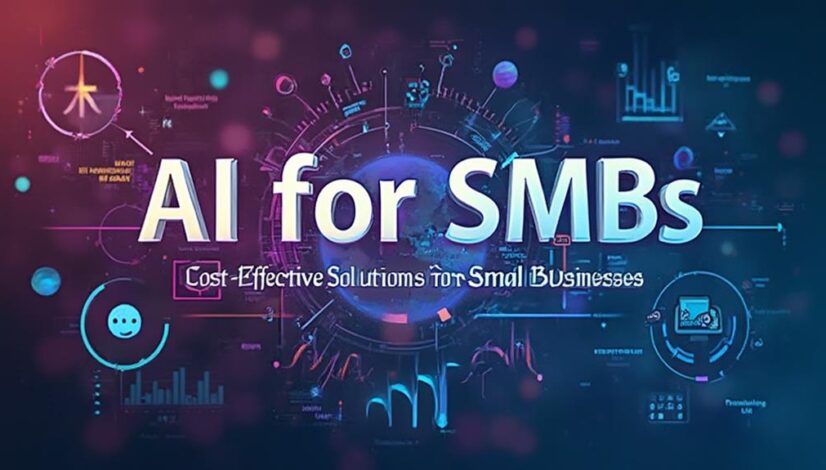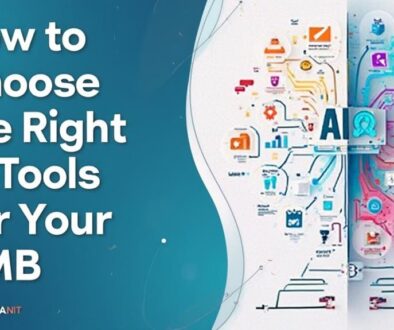AI for SMBs: Cost-Effective Solutions for Small Businesses
AI presents small and medium-sized businesses (SMBs) with cost-effective solutions that greatly enhance operational efficiency and customer satisfaction. Tools such as affordable CRM systems and intelligent scheduling software automate repetitive tasks, allowing staff to focus on strategic initiatives. These solutions help businesses make data-driven decisions through predictive analytics, fostering growth and innovation within constrained budgets. By implementing clear objectives and facilitating employee training, SMBs can optimize their usage of AI technologies. As the landscape of AI continues to evolve, there are emerging trends that could further reshape how SMBs operate and compete in the market. Discover these trends and more.
Key Takeaways
- Affordable AI tools like CRM systems and intelligent scheduling help SMBs streamline operations and improve customer interactions without breaking the budget.
- Subscription-based models offer gradual technology adoption, enabling SMBs to access advanced AI solutions tailored to their specific needs and budget constraints.
- Data-driven decision-making through predictive analytics empowers SMBs to adjust marketing strategies and enhance competitiveness based on consumer behavior insights.
- Employee training programs ensure staff are equipped to effectively use AI tools, facilitating a smoother transition and increasing overall productivity.
- Continuous monitoring and feedback systems allow SMBs to refine AI solutions, optimizing performance and ensuring they align with evolving business objectives.
Benefits of AI for SMBs

The integration of artificial intelligence (AI) into small and medium-sized businesses (SMBs) offers a transformative opportunity for enhanced efficiency and competitiveness. By leveraging AI technologies, SMBs can streamline operations, allowing for better allocation of resources. This results in heightened productivity, which is essential for SMBs aiming to make their mark in a competitive landscape.
One of the most significant advantages of AI is its capacity to generate valuable customer insights. Analyzing consumer data, AI tools facilitate deeper understanding of purchasing behaviors and preferences. This intelligence enables SMBs to tailor their marketing strategies and product offerings, enhancing customer satisfaction and loyalty. Consequently, businesses can serve their clientele more effectively, driving revenue growth.
Moreover, AI improves operational efficiency by automating repetitive tasks such as data entry, inventory management, and customer support. This automation not only reduces human error but also frees up valuable time for employees to focus on more strategic initiatives—fostering innovation and business growth.
Additionally, the adoption of AI solutions allows SMBs to make data-driven decisions. By interpreting complex datasets and trends, businesses can respond proactively to market changes, ensuring they remain nimble and adaptable in their operations.
Cost-Effective AI Tools
For small and medium-sized businesses (SMBs) looking to embrace the advantages of artificial intelligence, cost-effective AI tools are increasingly accessible. These solutions not only enhance productivity but also optimize operations without the hefty price tag traditionally associated with advanced technology.
One notable category of affordable automation tools is customer relationship management (CRM) systems. These AI-driven platforms streamline customer interactions and provide valuable insights through data analysis, empowering SMBs to tailor their marketing efforts effectively. With such tools, businesses can improve their customer service and drive engagement, ultimately boosting revenue.
Another crucial area where cost-effective AI shines is intelligent scheduling. This feature helps teams allocate resources efficiently and manage time effectively, reducing the likelihood of missed appointments or overbooked staff. Incorporating intelligent scheduling solutions alleviates the administrative burden from employees, allowing them to focus on core tasks that drive business growth.
Moreover, numerous AI tools offer subscription-based models, enabling SMBs to adopt technology incrementally based on their specific needs and budget. This flexibility allows small businesses to experiment with different solutions and scale as they grow, ensuring that their investment is aligned with their evolving requirements.
Implementation Strategies for Success

Successful implementation of AI tools in small and medium-sized businesses hinges on a strategic approach that includes clear objectives and robust planning.
To effectively harness the potential of AI, organizations must embrace change management and prioritize employee training. This will foster an environment where technology and talent align seamlessly, enabling the achievement of business goals.
Key strategies for successful AI implementation include:
- Define Clear Objectives: Establish specific goals for AI integration, focusing on aspects like efficiency, customer engagement, and competitiveness.
- Conduct a Needs Assessment: Evaluate existing workflows to identify areas where AI can provide the most value, ensuring a tailor-fit solution that meets unique business needs.
- Facilitate Employee Training: Equip staff with the necessary skills through targeted training programs, alleviating apprehension and enhancing productivity with the new technology.
- Monitor and Iterate: Implement a system of continuous feedback to assess the effectiveness of AI solutions, making adjustments as needed for ideal performance.
A thorough strategy not only identifies the right AI tools but also addresses the human aspect of transformation.
By incorporating change management principles, SMBs can foster an adaptive culture ready to embrace innovation. Empowered employees will feel more confident in utilizing AI, driving productivity and growth.
Ultimately, this strategic approach enhances an organization's capacity to thrive in a rapidly evolving digital landscape, releasing the freedom that comes with greater efficiency and improved decision-making.
Real-Life Case Studies
Real-world examples of small and medium-sized businesses (SMBs) successfully leveraging AI technologies provide valuable insights into effective strategies and outcomes. These success stories illustrate how innovative tools can transform operations and deliver considerable returns on investment.
For instance, a local bakery implemented an AI-driven inventory management system, allowing them to optimize their ingredient purchases based on predictive analytics. This system minimized food waste and lowered costs, letting the business allocate resources more effectively. Such industry examples showcase the transformative potential of AI in everyday business operations.
Another compelling case is a boutique marketing agency utilizing AI-powered customer segmentation tools. By analyzing customer data, the agency was able to personalize marketing campaigns greatly, resulting in a notable increase in engagement and conversions. This highlights how SMBs can harness AI to strengthen their customer relationships and drive revenue growth.
Moreover, a small financial service firm adopted AI chatbots to enhance client support. By automating responses to frequently asked questions, the firm greatly improved customer satisfaction and allowed staff to focus on higher-value tasks. These success stories reveal that SMBs can use AI not just to streamline their processes, but also to elevate their overall customer experience.
As these industry examples demonstrate, embracing AI technologies empowers SMBs to achieve operational efficiencies, reduce costs, and drive innovation. By learning from these real-life case studies, other small businesses can navigate their own journeys into the domain of AI, sparking growth and fostering success in an increasingly competitive landscape.
Future Trends in AI for SMBs

As technological advancements continue to reshape the business landscape, small and medium-sized businesses (SMBs) can expect a wave of transformative trends in artificial intelligence (AI) that will redefine their operational capabilities.
The future of AI for SMBs will be characterized by a greater focus on data-driven decision-making, enabling organizations to leverage customer insights to drive growth.
Key trends to watch include:
- AI Personalization: Tailoring products and services to individual customer preferences, enhancing the consumer experience.
- Predictive Analytics: Utilizing past data to forecast future trends, allowing SMBs to anticipate market changes and customer needs.
- Automation Trends: Streamlining operations through intelligent automation, freeing up valuable resources to innovate and focus on core business activities.
- Data Security Measures: Enhancing cybersecurity protocols to protect sensitive information, an increasing concern as businesses turn to digital solutions.
As these trends evolve, SMBs will need to navigate integration challenges, considering how to blend AI initiatives into existing structures without disruption.
Scalability options will become paramount as businesses seek solutions that grow alongside them.
However, with great power comes responsibility, and ethical considerations surrounding AI implementation will demand attention to guarantee that technology is used responsibly while maintaining consumer trust.
How Can AI Solutions Help SMBs Improve Their Branding Cost-Effectively?
AI solutions provide SMBs with tools to personalize marketing, analyze consumer behavior, and streamline content creation, reducing costs while enhancing brand impact. Automated processes ensure consistency across platforms, building trust and recognition. By leveraging ai tips for smb branding success, businesses can maximize their branding efforts efficiently without stretching their budgets.
Frequently Asked Questions
How Can AI Improve Customer Engagement for Small Businesses?
AI can greatly enhance customer engagement by enabling personalized marketing and automated responses.
By analyzing customer data, businesses can tailor their communications and offers, creating a more relevant experience that fosters loyalty.
Automated responses streamline interactions, ensuring timely support and engagement, which is essential in today's fast-paced environment.
This combination not only improves customer satisfaction but also allows small businesses to operate more efficiently, ultimately leading to sustained growth and freedom in decision-making.
What Industries Benefit Most From AI Solutions in Smbs?
Industries leveraging AI solutions experience transformative benefits, particularly in sectors like retail, healthcare, finance, and logistics.
Retail analytics streamlines inventory and enhances customer interactions. In healthcare automation, patient management becomes more efficient. Financial forecasting improves fiscal decision-making, while marketing optimization drives targeted campaigns.
Additionally, logistics management enhances delivery systems, and customer support bots guarantee swift responses.
These applications collectively empower small businesses to thrive and maintain competitive advantages in their respective markets.
Are There Free AI Tools Available for Small Businesses?
Yes, there are several free AI tools available for small businesses, including open source options that empower startups and entrepreneurs.
These tools often come with robust features suitable for various applications, ranging from data analysis to customer engagement.
Additionally, beginner resources are plentiful, offering guidance to navigate these technologies effectively.
How Can SMBS Measure the ROI of AI Investments?
In the garden of business, nurturing AI investments is akin to planting seeds that promise fruitful yields.
To measure ROI on these investments, small businesses can utilize AI investment metrics such as cost savings, increased productivity, and revenue growth.
Employing ROI tracking techniques—including benchmarking performance pre-and post-implementation—will enable organizations to assess the health of these seedlings, ensuring they flourish into bountiful trees bearing the fruits of efficiency and innovation.
What Skills Do Employees Need to Effectively Use AI Tools?
To effectively utilize AI tools, employees require a blend of essential skills. AI training is essential for understanding tool proficiency and functionality.
Moreover, fostering data literacy empowers employees to interpret and leverage data effectively. Employee adaptability enhances the ability to embrace technological changes, while critical thinking guarantees sound decision-making.
Conclusion
In the dynamic landscape of small and medium-sized businesses, the integration of AI emerges as a beacon of opportunity, illuminating pathways to efficiency and innovation. As cost-effective tools blossom, implementation blossoms into a garden of potential. Real-life case studies serve as vibrant illustrations of success, inspiring others to embrace the future. Anticipated trends in AI hold the promise of transformative growth, ensuring that SMBs not only survive but thrive in an ever-evolving marketplace.




